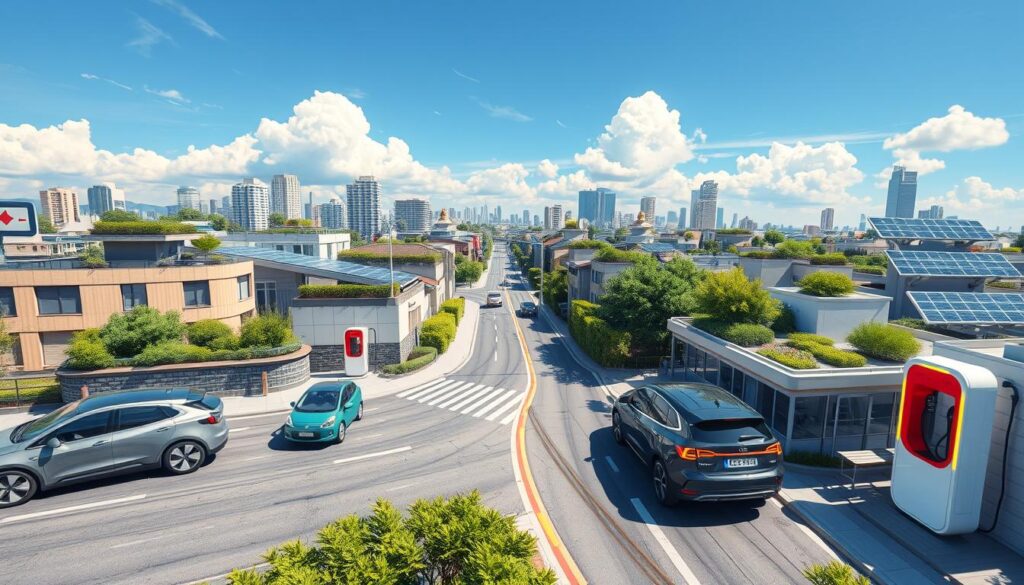About two years ago, the European Union set a goal to stop selling new cars with internal combustion engines by 2035. Yet, in May 2024, sales of Battery Electric Vehicles (BEVs) are not growing. Instead, they are going down. This has surprised many in the car industry, making people question if the move to electric cars is slowing down.
But, experts think this is just a short pause. Electric cars have many benefits over traditional ones. They produce no local pollution, are easier to make, and give more room for passengers. They also work well with our mobile devices. So, the shift to electric vehicles is still an exciting change to follow.
Key Takeaways
- The adoption of battery electric vehicles (BEVs) has faced unexpected challenges, with sales stagnating or falling in some markets.
- Despite the setbacks, electric cars offer significant advantages, including zero local emissions, easier manufacturing, and enhanced passenger space.
- The transition to EVs remains a closely watched and evolving landscape, with factors like charging infrastructure and battery costs playing a crucial role.
- Automakers and policymakers are grappling with the complexities of the EV shift, with some reconsidering the ambitious 2035 timeline for the transition.
- The future of driving is electric, but the path forward may involve a more nuanced and adaptable approach to meet the diverse needs of urban and rural areas.
The Rise of EV Cars: Advantages and Challenges
Electric vehicles (EVs) have many benefits. Battery electric vehicles are great because they don’t emit pollution and are quieter. They also have more room inside and can speed up quickly. EVs are set to change how we travel in the future.
Strengths of Battery Electric Vehicles
EVs are very efficient with energy. They turn electric energy into movement better than other cars. This means they use less energy and cost less to run.
EVs also have more room for passengers and cargo because their parts are smaller. They work well with our love for digital and phone connectivity. This makes driving an EV better and easier.
Current Hurdles for EV Adoption
Even with their benefits, EVs face some big challenges. Batteries are still too expensive, making EVs hard to buy. The cost of replacing batteries also affects how much people want to buy them.
There’s also not enough places to charge EVs, especially for car rental companies. Recycling batteries is hard because we can’t get enough of the important metals needed. This is a big problem for the future.
| Advantage | Benefit |
|---|---|
| Zero local emissions | Reduced environmental impact and improved air quality |
| Quieter operation | Improved driving experience and reduced noise pollution |
| Greater interior space | More comfortable and versatile transportation |
| Impressive acceleration | Enjoyable and responsive driving dynamics |
As the EV market grows, solving these problems is key. It will help make electric cars more popular and support a greener future.
EV Cars: Reshaping Urban and Rural Mobility
The rise of electric vehicles (EVs) is changing how we move in cities and the countryside. In busy cities, small electric cars could ease traffic jams by needing less battery than big SUVs or trucks. With slower city speeds, these cars can be made safer, using even less battery.
For rural areas, traditional cars could be a good option if made to produce no emissions. But, EVs are growing slower in rural places than in cities. In India, for example, most people live outside cities, offering a big chance for EVs to make a mark.
Countries like India, Thailand, and Indonesia are seeing more people choose EVs, but there’s a lot we don’t know about how people in poorer countries feel about them. Most studies in India focus on city folks, leaving us in the dark about what rural folks think of EVs.
| Region | EV Adoption Trends | Challenges |
|---|---|---|
| Urban Areas |
|
|
| Rural Areas |
|
|
As we aim for a greener future, EVs will play a big role in changing how we get around in cities and the countryside. It’s key to understand what both city and rural folks need and face to make the switch to electric vehicles smoother.
The Transition to ev cars: Projections and Factors
The world is moving towards a greener future, and electric vehicles (EVs) are leading the charge. Industry experts predict that EVs could make up to 20% of new car sales by 2025. By 2030, this number could jump to 40%, and by 2040, nearly all new cars sold could be electric.
But, how fast we get there depends on many things. These include how often cars are replaced, when car makers switch to electric, laws, and building more charging stations. In 2023, China led with almost 60% of electric car sales, Europe with just under 25%, and the U.S. with 10%, making up almost all new electric car sales.
- In China, 8.1 million new electric cars were registered in 2023, a 35% jump from the year before.
- In the U.S., 1.4 million new electric cars hit the roads in 2023, a 40% increase from 2022.
- Europe saw nearly 3.2 million new electric cars registered in 2023, a 20% rise from the year prior.
Things like the cost of owning an electric car, how people drive, and worries about running out of charge will affect how fast people switch to EVs. As technology gets better and more charging stations are built, electric cars are set to change how we travel. This could lead to a cleaner, greener future for driving.
“By 2030, the global share of EV sales is projected to rise to 35% according to the IEA Stated Policies Scenario (STEPS).”
The steady increase in EVs and efforts from governments, car makers, and buyers show the shift to electric vehicles is happening. This promises a cleaner, more efficient future for our roads.
Conclusion
The future of driving is electric. EVs are becoming more popular worldwide. Despite some challenges like battery costs and charging, EVs are the best choice for the future.
In Nigeria, EVs will change how we move in cities and rural areas. With the right support, EVs can help reduce our reliance on fossil fuels. They can also cut down on carbon emissions and change how we drive.
EVs offer big savings on fuel and maintenance. Plus, there are more charging stations and home charging options now. This makes EVs a great choice for drivers in Nigeria.
EVs are more than just a trend; they’re a game-changer in transportation. With strong support and planning, Nigeria can lead in this shift. This will bring us a greener, more efficient, and high-tech way of getting around.

